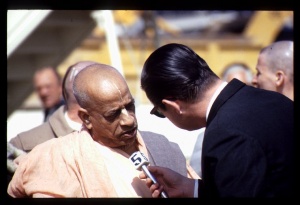CC Adi 7.131 (1975): Difference between revisions
(Vanibot #0027: CCMirror - Mirror CC's 1996 edition to form a basis for 1975) |
(Vanibot #0020: VersionCompareLinker - added a link to the Version Compare feature) |
||
| Line 2: | Line 2: | ||
<div style="float:left">'''[[Sri Caitanya-caritamrta (1975)|Śrī Caitanya-caritāmṛta (1975)]] - [[CC Adi (1975)|Ādi-līlā]] - [[CC Adi 7 (1975)|Chapter 7: Lord Caitanya in Five Features]]'''</div> | <div style="float:left">'''[[Sri Caitanya-caritamrta (1975)|Śrī Caitanya-caritāmṛta (1975)]] - [[CC Adi (1975)|Ādi-līlā]] - [[CC Adi 7 (1975)|Chapter 7: Lord Caitanya in Five Features]]'''</div> | ||
<div style="float:right">[[File:Go-previous.png|link=CC Adi 7.130 (1975)|Ādi-līlā 7.130]] '''[[CC Adi 7.130 (1975)|Ādi-līlā 7.130]] - [[CC Adi 7.132 (1975)|Ādi-līlā 7.132]]''' [[File:Go-next.png|link=CC Adi 7.132 (1975)|Ādi-līlā 7.132]]</div> | <div style="float:right">[[File:Go-previous.png|link=CC Adi 7.130 (1975)|Ādi-līlā 7.130]] '''[[CC Adi 7.130 (1975)|Ādi-līlā 7.130]] - [[CC Adi 7.132 (1975)|Ādi-līlā 7.132]]''' [[File:Go-next.png|link=CC Adi 7.132 (1975)|Ādi-līlā 7.132]]</div> | ||
{{CompareVersions|CC|Adi 7.131|CC 1975|CC 1996}} | |||
{{RandomImage}} | {{RandomImage}} | ||
==== TEXT 131 ==== | ==== TEXT 131 ==== | ||
| Line 11: | Line 10: | ||
<div class="verse"> | <div class="verse"> | ||
:sarva-veda-sūtre kare kṛṣṇera abhidhāna | :sarva-veda-sūtre kare kṛṣṇera abhidhāna | ||
:mukhya-vṛtti | :mukhya-vṛtti chāḍi' kaila lakṣaṇā-vyākhyāna | ||
</div> | </div> | ||
| Line 18: | Line 17: | ||
<div class="synonyms"> | <div class="synonyms"> | ||
sarva-veda-sūtre—in all the aphorisms of the Vedānta-sūtra; kare—establishes; kṛṣṇera—of Lord Kṛṣṇa; abhidhāna—explanation; mukhya-vṛtti—direct interpretation; | sarva-veda-sūtre—in all the aphorisms of the Vedānta-sūtra; kare—establishes; kṛṣṇera—of Lord Kṛṣṇa; abhidhāna—explanation; mukhya-vṛtti—direct interpretation; chāḍi'-giving up; kaila—made; lakṣaṇā—indirect; vyākhyāna—explanation. | ||
</div> | </div> | ||
| Line 25: | Line 24: | ||
<div class="translation"> | <div class="translation"> | ||
"In all the Vedic sūtras and scriptures, it is Lord Kṛṣṇa who is to be understood, but the followers of Śaṅkarācārya have covered the real meaning of the Vedas with indirect explanations. | |||
</div> | </div> | ||
| Line 33: | Line 32: | ||
<div class="purport"> | <div class="purport"> | ||
It is said: | It is said: | ||
:vede rāmāyaṇe caiva | |||
:vede rāmāyaṇe caiva purāṇe bhārate tathā | :purāṇe bhārate tathā | ||
:ādāv ante ca madhye ca hariḥ sarvatra gīyate | :ādāv ante ca madhye ca | ||
:hariḥ sarvatra gīyate | |||
In the Vedic literature, including the Rāmāyaṇa, Purāṇas and Mahābhārata, from the very beginning (ādau) to the end (ante ca), as well as within the middle (madhye ca), only Hari, the Supreme Personality of Godhead, is explained. | |||
</div> | </div> | ||
Latest revision as of 19:16, 26 January 2020

A.C. Bhaktivedanta Swami Prabhupada
TEXT 131
- sarva-veda-sūtre kare kṛṣṇera abhidhāna
- mukhya-vṛtti chāḍi' kaila lakṣaṇā-vyākhyāna
SYNONYMS
sarva-veda-sūtre—in all the aphorisms of the Vedānta-sūtra; kare—establishes; kṛṣṇera—of Lord Kṛṣṇa; abhidhāna—explanation; mukhya-vṛtti—direct interpretation; chāḍi'-giving up; kaila—made; lakṣaṇā—indirect; vyākhyāna—explanation.
TRANSLATION
"In all the Vedic sūtras and scriptures, it is Lord Kṛṣṇa who is to be understood, but the followers of Śaṅkarācārya have covered the real meaning of the Vedas with indirect explanations.
PURPORT
It is said:
- vede rāmāyaṇe caiva
- purāṇe bhārate tathā
- ādāv ante ca madhye ca
- hariḥ sarvatra gīyate
In the Vedic literature, including the Rāmāyaṇa, Purāṇas and Mahābhārata, from the very beginning (ādau) to the end (ante ca), as well as within the middle (madhye ca), only Hari, the Supreme Personality of Godhead, is explained.